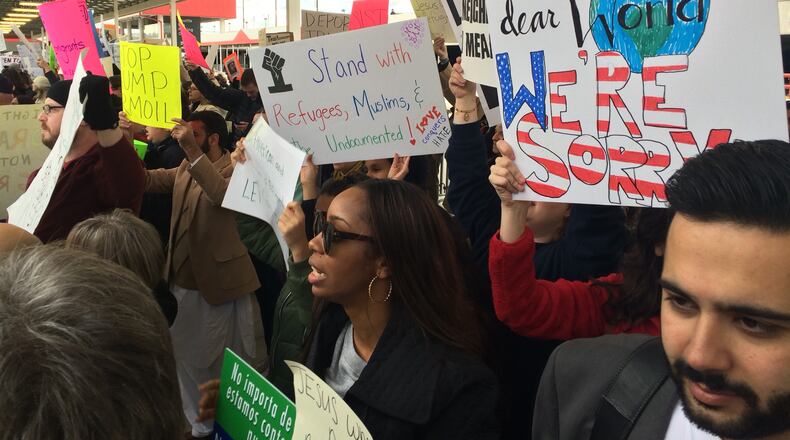While protests broke out around the country, Georgia’s college leaders were working to decipher the impact of President Donald Trump’s immigration order on their students and faculty, while trying to also reassure them.
Officials in the state’s public college system were hesitant to speak about the order. A statement sent out to public college presidents late Sunday by University System of Georgia Chancellor Steve Wrigley, said the system is monitoring updates from the federal State Department, and it instructed international students and employees to consult with their school’s international education office for any travel guidance.
Emory University's president Claire Sterk was more forceful, calling the situation "largely uncharted waters."
"I wholeheartedly share the concerns and insecurity expressed by many of you. While I believe in the need for immigration laws and a strong visa process for national security, I am concerned about the impact that this executive order may have on our faculty, students and staff," she said in a message to the Emory community Saturday.
The sentiments echoed those of college leaders across the country working to balance the federal rules with the needs of their schools and international communities in their schools.
A day after it was released, Trump’s executive order was already impacting Georgia students.
A third-year doctoral student at Clark Atlanta University traveling back from Saudi Arabia with her sister was detained at an airport in that country. Airport officials told Reham Noaman, 31, and her sister, a sophomore at Georgia State University, they couldn't issue them boarding passes for their direct flight to Atlanta.
The sisters, who hold F1 student visas, were told by airport officials the denial was due to the president's order. The executive order suspends all refugees from entering the U.S. for 120 days, and bars those from war-torn Syria indefinitely. It also blocks entry to citizens from seven Muslim nations, including Noaman's home country of Yemen, for 90 days.
Georgia schools such as Clark Atlanta have done significant recruiting for international students and faculty.
“This is preventing us from attending classes,” Noaman told The Atlanta Journal-Constitution when reached by phone Sunday. “This is a big distraction that could cause us to miss the whole semester, and this is something that doesn’t make any sense.”
More than 6,0000 college and university academics, including several from Georgia institutions, signed a national petition over the weekend denouncing the executive order. The group argues, among other things, that the order will "significantly damage" the country's higher education reputation because it hurts many of the researchers working at United States schools who are from the countries named in the travel order.
“We’ve actively recruited from the Arab world for students who speak Arabic, who are experts in ISIS propaganda … and now it feels like these students have been lured here on false pretenses,” said Mia Bloom a communications professor and terrorism scholar at Georgia State University.
The Institute for International Education estimates more than 15,000 students from the impacted nations attended U.S. colleges in the 2015-16 school year.
“Students are concerned. My students fear they won’t be able to see their families or come back here if they leave,” Bloom said. “No one ever envisioned that this would be constitutional and legal.”
Since the inauguration, Trump has been busy fulfilling campaign promises, said Kerwin Swint, political science professor at Kennesaw State University.
Trump knows these orders have to be followed through with other kinds of legislative action, Swint said.
With the college students impacted, hopefully this is a short-term problem and the real issues will be worked out in the next few days, he said.
About the Author
Keep Reading
The Latest
Featured





